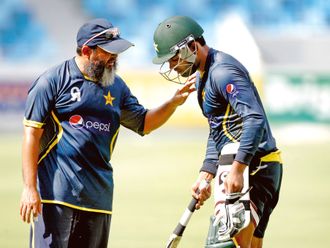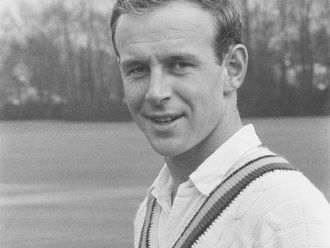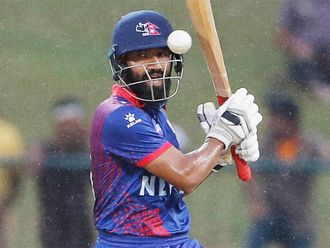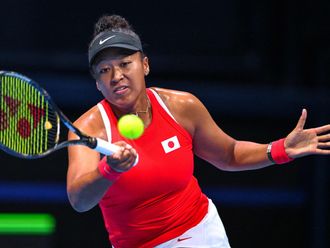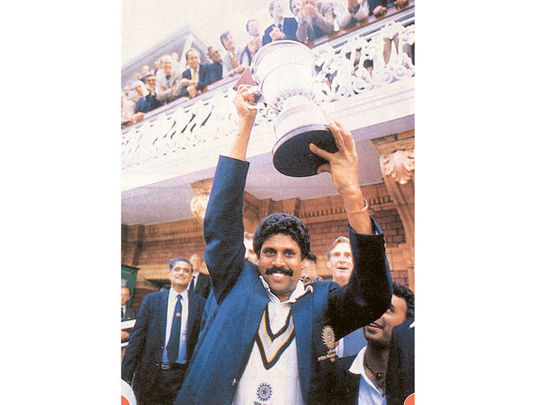
The World Cup really came alive for me way back in 1983 when I was 11-years-old. I was in the ‘line-up’ for breakfast at Boarding School when we heard the news that Zimbabwe had beaten Australia at Trent Bridge. The news was magical — almost too hard to imagine, let alone believe.
It was a pretty good team, mind you. The players were heroes to us, of course, but we didn’t expect them to compete with the ‘big’ countries. Duncan Fletcher was captain and was man-of-the-match against Australia, but there were a couple of other fine all-rounders, Kevin Curran and Iain Butchart to name just two.
There was no TV, of course, so we relied on the radio commentary from then on. I’ll never forget listening when India were reduced to 17-5. We assumed somebody must have tuned into the wrong station. Maybe it was a hoax? Then Kapil Dev smashed 175 and ended the dream in emphatic fashion.
My own turn came eight years later when I was selected in the squad for the ’92 tournament in Australia. I was still a teenager. South Africa had been invited to participate at the last minute and they came to Harare for a warm-up game en route to Australia. I was bowled, first ball, by Allan Donald and the middle stump cartwheeled so far back it almost hit wicket keeper Dave Richardson between the eyes. It was quite an introduction to international cricket. As they say, you can’t hit what you can’t see.
My official debut came against the West Indies a few weeks later. Kevin Arnott had a finger broken and Andy Pycroft, wearing a visorless helmet, was hit by a bouncer. There was blood. I walked in to bat at number six thinking ‘this will be interesting’. Or something to that effect.
Dave Houghton was at the other end. He said: “I have good news and bad news. The good news is that Carl Hooper is coming on to bowl. The bad news,” he said, indicating to third man, “is that he’s also warming up”. It was Patrick Patterson, one of the fastest in the world at that stage. Unsurprisingly, I was dismissed very quickly for a single, having a slog at Hooper.
But the highlight was the win against England in Albury. I was 12th man for the game but that didn’t matter. The sense of joy and satisfaction I felt at sharing in the win has stayed with me forever. We didn’t think we had any chance after being bowled out for 134 but Eddo Brandes took 4-21 and John Traicos, at the age of 45, bowled his ten overs for just 16 runs. England were dismissed for 125 with five balls to spare. It was extraordinary stuff. A top order of Gooch, Botham, Lamb, Robin Smith and our former countryman, Graeme Hick, wasn’t good enough to beat us. And Neil Fairbrother and Alec Stewart. Mind blowing.
Although we made the Super Six stage in 2003, it was nothing like doing it in 1999, in England. In 2003 we were given points because two teams declined to play their group games in Zimbabwe. In England, we got there on merit. That will always rank among my proudest achievements as captain.
We were appalling to start with. Three warm-up matches against county teams were all lost. I called an emergency team meeting to address our performances, and there were a lot of blank faces. We beat Kenya comfortably in our first game but were well beaten by Sri Lanka in Worcester.
The game against India was as extraordinary as any I ever played in. Andy and Grant Flower guided us to 254 but, because India’s overrate had been so poor, they only had 46 overs to chase it down. But they were cruising at 246-7. Then I brought Henry Olonga back into the attack. He had bowled poorly earlier on, and was having a bad tournament. My choice of death bowler was widely criticised at the time, but Henry knocked the last three wickets over and we won by 3 runs. It was absurd and happy in equal measure.
But we still had to win the final match against South Africa to advance. We didn’t have a chance. I didn’t even get my spare laundry done to save on the exorbitant hotel costs. We all realised our chances of staying in the tournament were on the slender side of minimal. But maybe that was our secret weapon. We didn’t even have a particularly formal team meeting beforehand. We just discussed the batting order and encouraged each other to enjoy it, last match of the tournament. SA were a team of super stars.
We managed 233-6 which was below par at Chelmsford, but before we knew it they were 40-6 in reply! The first inkling I had that something strange might happen was when I set the field for the first over. On a hunch, I asked Andrew Whittall to stand at fourth slip. The very first ball of the innings, from Neil Johnson, spat off a good length and hit the shoulder of Gary Kirsten’s bat. It was the simplest catch in the world. Sometimes you cannot explain these things.
There had been a rain shower during the lunch break. Perhaps that played into our hands. But many years later I heard from the South African players that captain Hansie Cronje had been talking extensively before the match about who they would be playing in the Super Sixes and their potential semi-final opponents. It seemed obvious that he was a little complacent, and that some of his players were uncomfortable with that.
We had our chances to reach the semi-final but it wasn’t to be. The washout against New Zealand hurt us and we had a tremendous game against Australia at Lord’s in which they scored 300 and we were on track for a remarkable chase for a long time before falling short.
The 2003 tournament is one best forgotten for me. It will forever be remembered for Andy and Henry’s black armband protest at the death of democracy in Zimbabwe. I was dropped in unhappy circumstances before the tournament and then called out of the commentary box as a last-minute injury replacement for Mark Vermeulen. I hadn’t played for six weeks. We were hammered by Pakistan in the final Super Six match.
The World Cup is everything to the game. Even Englishmen and Australians, who have the Ashes, and Indians and South Africans who have their own, iconic series, share the unique symbolism and importance of the World Cup. It is critical in keeping the game healthy and prosperous. It was my dream to compete in it all those years ago, and it must remain a dream for millions of other kids for many, many years to come.
— ICC Development (International) Limited 2003



